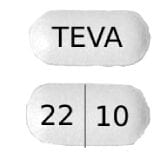Uses
Sucralfate is used to treat and prevent the return of duodenal ulcers (ulcers located in the first part of the small intestine). Treatment with other medications, such as antibiotics, may also be necessary to treat and prevent the return of ulcers caused by a certain type of bacteria (H. pylori) Sucralfate is in a class of medications called protectants. It sticks to damaged ulcer tissue and protects against acid and enzymes so healing can occur.
Side Effects Of Sucralfate
Sucralfate may cause side effects. Tell your doctor if any of these symptoms are severe or do not go away:
- constipation
Some side effects of sucralfate can be serious. If you experience any of the following symptoms, call your doctor immediately or get emergency medical treatment:
- hives
- rash
- itching
- difficulty breathing or swallowing
- swelling of the face, throat, tongue, or lips
Sucralfate may cause other side effects. Call your doctor if you have any unusual problems while taking this medication.
Warnings & Precautions
Before taking sucralfate:
- tell your doctor and pharmacist if you are allergic to sucralfate, any other medications, or any of the ingredients in sucralfate tablets or liquid. Ask your pharmacist for a list of the ingredients.
- tell your doctor and pharmacist what other prescription and nonprescription medications, vitamins, nutritional supplements, and herbal products you are taking or plan to take with sucralfate. Be sure to mention anticoagulants (‘blood thinners’) such as warfarin (Coumadin); cimetidine (Tagamet); cinoxacin (Cinobac); ciprofloxacin (Cipro); digoxin (Lanoxin); enoxacin (Penetrex); ketoconazole (Nizoral); levofloxacin (Levaquin); levothyroxine (Levothroid, Levoxyl, Synthroid); lomefloxacin (Maxaquin); nalidixic acid (NegGram); norfloxacin (Noroxin); ofloxacin (Floxin); phenytoin (Dilantin, Phenytek); quinidine; ranitidine (Zantac); sparfloxacin (Zagam); tetracycline; and theophylline (Theo-24) If you are taking any of these medicines, take them at least 2 hours before taking sucralfate. Your doctor also may need to change the doses of your medications or monitor you carefully for side effects.
- if you are taking antacids, take them at least 30 minutes before or after sucralfate.
- tell your doctor if you have or have ever had kidney disease, diabetes, or any conditions that may cause difficulty swallowing or that may affect your gag or cough reflexes. Also, tell your doctor if you have other gastrointestinal disorders or if you are receiving enteral tube feedings.
- tell your doctor if you are pregnant, plan to become pregnant, or are breast-feeding. If you become pregnant while taking sucralfate, call your doctor.
Sucralfate Dosage
Sucralfate comes as a tablet and liquid to take by mouth. If you are taking sucralfate to treat ulcers, the tablets or liquid usually are taken four times a day. If you are taking sucralfate to prevent an ulcer from returning after it has healed), the tablets usually are taken twice a day. Take sucralfate on an empty stomach, 2 hours after or 1 hour before meals. Take sucralfate around the same times every day. Follow the directions on your prescription label carefully, and ask your doctor or pharmacist to explain any part you do not understand. Take sucralfate exactly as directed. Do not take more or less of it or take it more often than prescribed by your doctor.
Shake the liquid well before each use to mix the medication evenly.
This medicine must be taken regularly to be effective. It may take up to 8 weeks for ulcers to heal.
Other
Keep all appointments with your doctor and the laboratory. Your doctor may order certain lab tests to check your response to sucralfate.
Do not let anyone else take your medication. Ask your pharmacist any questions you have about refilling your prescription.
It is important for you to keep a written list of all of the prescription and nonprescription (over-the-counter) medicines you are taking, as well as any products such as vitamins, minerals, or other dietary supplements. You should bring this list with you each time you visit a doctor or if you are admitted to a hospital. It is also important information to carry with you in case of emergencies.
Source
All information has been provided courtesy of MedLinePlus from the National Library of Medicine and from the FDA.



